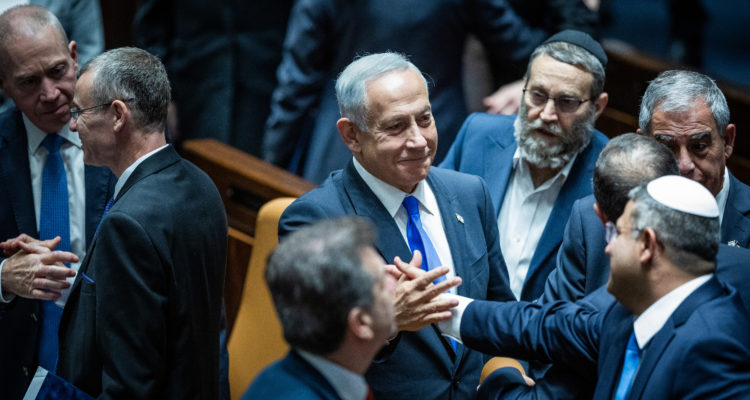“I’m controlling the government, and I’m responsible for its policies, and the policies are sensible, and responsible, and continue to be that,” says the Israeli premier.
By JNS
Prime Minister Benjamin Netanyahu assured CNN‘s Jake Tapper on Tuesday that he had “two hands on the wheel” of his government.
“I’m controlling the government, and I’m responsible for its policies, and the policies are sensible, and responsible, and continue to be that,” Netanyahu told Tapper in a wide-ranging interview.
Pressed on the more extreme past statements of some of his coalition members, Netanyahu said, “Well, a lot of people say a lot of things when they’re not in power. They sort of temper themselves when they get into power. And that’s certainly the case here.”
In response to a query regarding Justice Minister Yariv Levin’s judicial reform package, which has led to mass protests in Israel, Netanyahu said that an “independent judiciary doesn’t mean an unbridled judiciary.”
“In order to secure freedom and democracy, you need the balance between three branches of government,” Netanyahu said. “In Israel, that balance has been thrown askew and you have one branch, a huge branch, a tree trunk—the judiciary—basically overcoming, arrogating to itself, the powers of the legislative and the government,” he continued.
Israel’s Supreme Court justices “self-select,” he noted, referring to the fact that judges hold veto power in Israel’s Judicial Selection Committee.
“This is a system we have in Israel. And if I say to you, this is democracy, you’d say that’s ridiculous. It’s unacceptable,” said Netanyahu.
The reform plan would change the way judges are appointed, giving the majority on the selection committee to elected officials, he explained. The justices would also be appointed in a public hearing, instead of behind closed doors as is the current situation, he added.
With regard to the so-called “override clause” in the reform package, that would enable the Knesset, with a majority of 61 members, to reverse Supreme Court decisions to overturn legislation, Netanyahu pointed out that Canada has exactly the same provision. In Britain, he added, the court isn’t allowed to strike down any legislation passed by parliament.
“Is Canada not a democracy? Is Britain not a democracy?” he asked.
Tapper noted that strong supporters of Israel, such as attorney Alan Dershowitz, argue that the judicial reforms will make it harder to defend Israel on the international stage.
“I respectfully disagree,” Netanyahu replied. “It brings Israel in line with most of the democracies of the world. Because Israel is right now an outlier. Israel has the most extreme judicial activism, that’s gone off the rails. And we’re trying to bring it back to where just about all the democracies are, both in the selection of judges and in the balance between the various branches of government.”
On the issue of settlements, Tapper said that there’s some concern in the Biden administration about the expansion of settlements, and it’s “worried about that bringing Israel on a path where peace is never going to be possible.”
“Well, I totally disagree,” Netanyahu said. “The Jewish people have been here for 3,500 years.”
He said it’s a mistake to get “hung up” on making peace with the Palestinians.
“For 25 years, the Palestinians—who don’t want peace with Israel, who want to see a peace without Israel, who don’t want a state next to Israel, but a state instead of Israel—they had an effective veto on Israel’s expansion of the circle of peace around it,” Netanyahu said.
“I went around them. I went directly to the Arab states, and forged a new concept of peace for peace, peace through strength. I forged four historic peace agreements, the Abraham Accords, which is twice the number of peace agreements that all my predecessors in 70 years got combined.”





